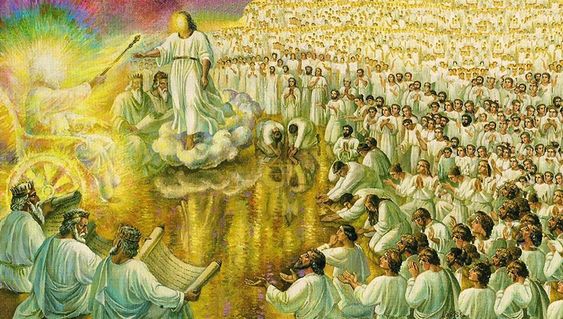If this is your first viewing, please see my Introduction before reading this.
23 December. John chapters 13-15
Here we have Jesus’ final speech to his disciples, in the course of which he washes their feet to demonstrate that his way of loving and saving people begins with serving their practical needs. There is much that could be said about any small part of this important speech, but I will start with one verse – “Very truly, I tell you, whoever receives one whom I send receives me; and whoever receives me receives him who sent me” (13:20).
It reminds me at this Christmas season of another verse from the beginning of John’s Gospel which is traditionally read on Christmas Eve – “To all who received him, who believed in his name, he gave power to become children of God” (1:12). Put the logic of those verses together in the right order, and whoever “receives one whom I send” (any Christian proclaiming Jesus) can “become a child of God”.
What makes Christianity different from many other religions and philosophies is that it is not really about believing certain things about God and the world, and even less about how we behave (although neither of those is unimportant). Principally, to be a Christian is to receive Jesus, who became flesh for us, in our bodies as well as our minds, and this is never something done in isolation, it is equally about becoming part of the community of other believers, which started with the eleven faithful disciples at the Last Supper, and now numbers hundreds of millions around the world.
The act of receiving Jesus has variously been expressed in different ways – “inviting Jesus into your life”, “turning to Jesus”, “being born again” (see my blog for 18 December). It is symbolised in the one-off act of being baptised, and is also part of the repeated symbolism of the Eucharist or Mass, in which some people will share at Christmas if at no other time of year. By eating a piece of the broken and shared bread that represents Jesus’ body offered in sacrifice for us, we become part of the “body” of Christians. Even if, with most protestant/evangelical Christians, you don’t believe that the bread literally becomes Christ’s flesh, it is still a reminder of that holy and sinless body that first appeared on earth about 2020 years ago in Bethlehem.
This dual emphasis on both the physicality of Jesus’ incarnation and our relationship with him, and on the act of serving others as the proof of sharing in his love, is why at this time of year individual Christians and congregations often make more effort than usual to attend to the needs of those around them. It might be inviting lonely people for a festive meal, singing carols in care homes, opening the church building as a shelter for homeless people on winter nights, or giving food and clothing through local foodbanks and charities that work with people living in poverty. Of course people of other religions or none do the same – compassion is a human instinct. But where these acts of charity and compassion are motivated by the love of Jesus, there is also the offer to those being served of becoming part of the Body of Christ themselves. “whoever receives one whom I send receives me; and whoever receives me receives him who sent me”.
